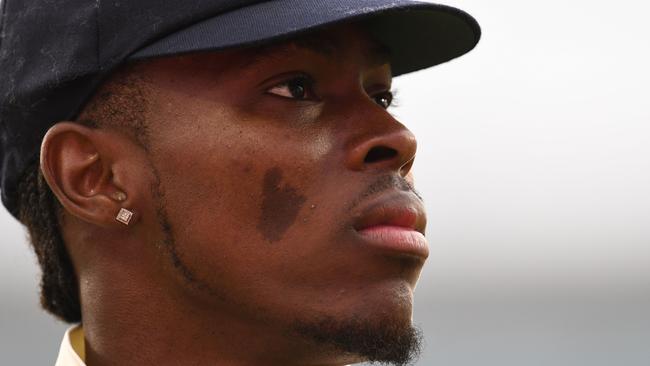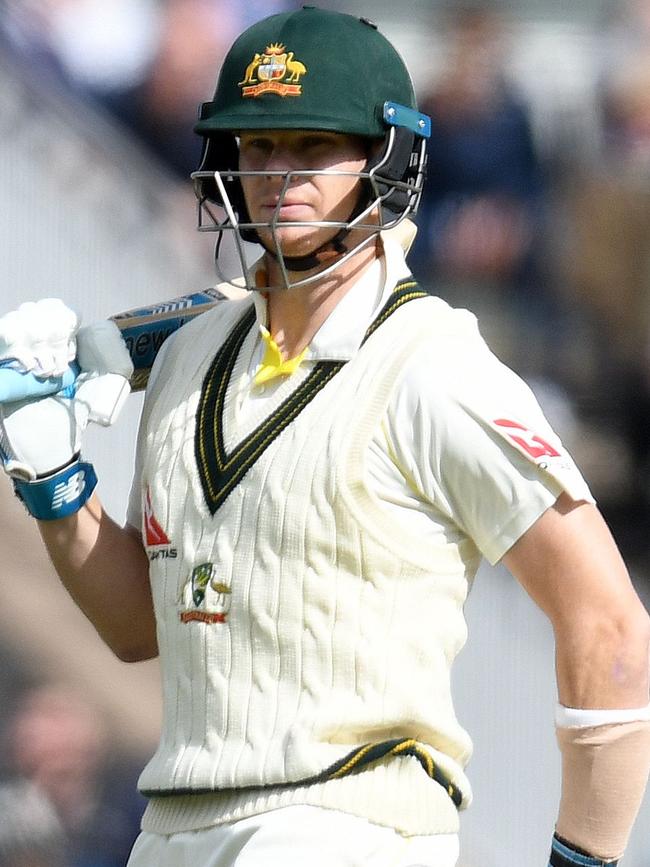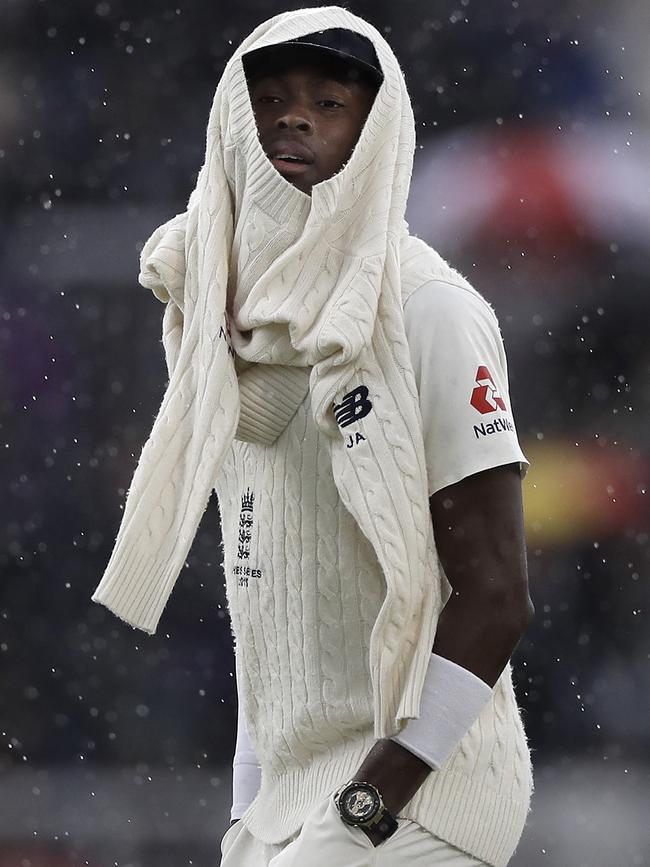
MORE: Day one recap | Gideon Haigh: For Smith and Labuschagne, it’s runs at first sight
It was a tough old day at Old Trafford, it must be said, for players and spectators alike. A September Test match in Manchester was always playing dice with the weather, and the conditions were foul — cold, rainy and blustery, allowing only 44 overs in all — at whose door must lay much of the blame for England’s lacklustre bowlers who clearly struggled with their rhythm. That said, and excuses noted, England’s performance was flat, as if Headingley had never happened.
Once Stuart Broad had picked the lock by nipping out both openers within the first half hour, England had an opportunity to land another blow so soon after last week’s victory, but a combination of tame bowling, and passive captaincy allowed Smith and Marnus Labuschagne, the sorcerer and the apprentice, to settle. Labuschagne was eventually dismissed five overs before what became the end of play, but not before he had helped Smith add 116 relatively untroubled runs for the third wicket, and at a decent lick, too.

Gum-chewing, grim-faced and determined, Labuschagne made his fourth consecutive Ashes half-century since being brought into the team as a concussion replacement for Smith, before he missed a nip-backer from Craig Overton. While Archer’s felling of Smith at Lord’s weakened Australia temporarily, it also brought Labuschagne into the fold and so, arguably, Australia’s batting has been strengthened now that Smith and the 25-year-old can hold the fort together, as they did here for 32 overs either side of lunch. Labuschagne scored freely on both sides of the wicket and it was a surprise, to him and us, when he was gated five overs before the close.
Smith, back in the groove and looking completely unfazed, broke his own record for the most consecutive Ashes half-centuries, this being his eighth. The shot to get there, flinging himself off his feet to thrash a wide half-volley from Ben Stokes to the cover boundary was pure Smith, the effectiveness of the stroke far outweighing the aesthetics. He remained unbeaten when heavy rain ended play for the day at tea and he came through the renewal of his battle with Archer with flying colours.
With Archer in the middle of his opening spell, Smith’s entrance was perfectly timed for a piece of sporting theatre, but they faced off for only seven balls before Root removed Archer from the attack, not to return again until after lunch.
Instead, once Archer took his leave, Jack Leach and Overton sent down ten of the remaining overs before lunch, serviceably but unthreateningly. The cheer that greeted Stokes into the attack for his initial four-over spell was the second loudest of the morning, but they were uneventful, one huge shout for leg-before against Labuschagne notwithstanding.
The loudest cheer had come shortly before when Warner was sent on his way for his second consecutive duck and sixth single-figure score of the series. He is looking hapless against Stuart Broad, to whom he fell for the fifth time this summer from round the wicket and the dismissal, edging a ball he was in two minds about leaving, betrayed his increasing uncertainty. Marcus Harris fell leg-before to the same ploy, after which, with two right-handers at the crease, Broad’s effectiveness was negated.
For Smith, there were no apparent effects from the blow to the neck suffered at Lord’s, except for the presence of a small arm guard, and the neck protectors, both of which were recent additions.


It took only three balls for Archer to test Smith’s mettle against the bouncer, but Smith coped admirably with that and every other short ball that came his way, determined as he was to let the ball fly over his left shoulder this time, rather than get caught attempting to sway inside the line as at Lord’s.
Archer was well below his best and a long way from his sharpest in his opening five overs, and did not improve much in a further five-over spell after lunch, either. To try and coax him into action, Root switched him ends after lunch, so that he was bowling with the cross wind at his back, rather than running marginally into it. It made no difference, except to annoy Broad, who was now forced to bowl from the opposite end from where he had been successful in the morning.
Broad’s mood had noticeably soured and was not improved by the frequent gusts of wind, which picked up in ferocity after lunch. Time and again, Labuschagne withdrew from his guard as Broad approached, distracted by a combination of the bails falling to the ground or detritus blowing behind the bowler’s arm. At one point, the umpires removed the bails for good, although the inaccuracy of the bowling meant they were rarely in danger in any case.
Heavier bails having been applied, Overton floored them when he beat Labuschagne’s forward push, after which Travis Head endured a tricky start. He survived and will have been relieved to do so. Relief all round, in fact, for Australia, who after an awkward start, had advanced to a promising position.
The ten-day break probably did them more good than England in that they were able to pick over the carcass of the Headingley defeat and then park it in the deepest recesses of their minds. Two players who were not involved there came into the team, one of whom, Smith, made his presence felt immediately. The other, Mitchell Starc, will get his chance in due course, and will hope the pitch quickens as the game advances.
The Times




The stage was set: two early wickets; a capacity crowd, full-throated roars at the ready; Jofra Archer, ball in hand, and Steve Smith at the crease. The stage set, then, for a full-blooded assault at the start of what could be a pivotal day. Entering the cauldron, Smith may have expected the fiercest of welcomes, but instead England’s hospitality was warm and convivial, unlike the weather, the cricketing equivalent of a cup of tea and a slice of cake.